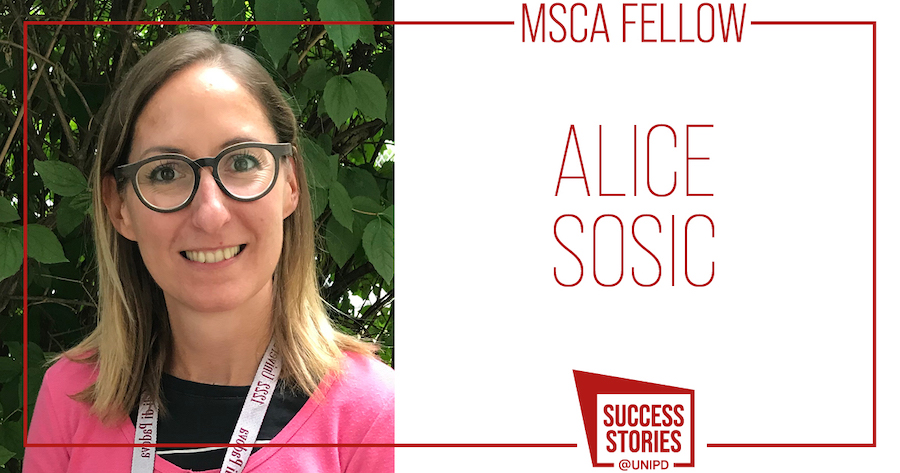
MSCA Fellow: Alice Sosic
A Global Fellowship from Padua to New York to work with important and very innovative techniques on antiviral agents’ development.
Let’s talk with Alice about her experience and ask her how she will fulfill her dream to build a lab to work with mass spectrometry for nucleic acids.

Alice is a medicinal chemist specialized in drug development and in the evaluation of drug molecular mechanisms of action. She obtained her PhD in Molecular Sciences in 2013 from the University of Padua, where she later worked as Postdoctoral Research Fellow.
Her project BICEPSvsHIV, "Novel strategies for anti-HIV-1 therapy: Small molecules targeting RNA partners of the nucleocapsid protein", focuses on the development of an original anti-HIV strategy that draws the spotlight on RNA leading to new antiretroviral agents, which are urgently needed to overcome the emergence of resistance to existing drugs.
You are a former MSCA Global Fellowship winner, your project started in July 2017, ended in June 2019 and was about novel therapies against HIV. Can you tell us something about your research path and why did you choose to apply for a MSCA-IF?
Before applying for the Global Fellowship I’ve always studied and worked at the University of Padua. I graduated in medicinal chemistry and I performed my PhD at the Department of Pharmaceutical and Pharmacological Sciences. Thanks to my PhD I started learning new techniques for the development of new drugs. My expertise has always been focused on antiviral agent development, that is anti-HIV agents. After the PhD I continued working as post-doc here at the University of Padua, but I’ve always been open to collaborations with external offices and research institutes in a multidisciplinary context. I think open-mindedness is really key to approach your research and a MSCA research project. After 3 and a half years of post-docs in Padua, I understood it was useful and necessary for me to have an experience abroad. So I planned to apply for a MSCA-IF. I wanted an opportunity to work in a new Country but also to come back with something new for me and my University.
How did you choose your Host Institution for your Global Fellowship?
I’ve always had great experiences at the University of Padua, both with my lab and with the University Offices: they’ve always helped me from a bureaucratic and administrative point of view. I already had some connections with my supervisor in Albany at the RNA Institute of the State University of New York, so it was not something completely new for me. I knew they were using important and very innovative techniques there. I work with mass spectrometry for nucleic acids, a very rare expertise here in Europe. Actually there are only a few labs, maybe three, working on this worldwide. It was very useful for me to go right there, I improved some specific skills that I knew I could bring back here to Europe. My hope was also to be able to build a similar lab here in Padua and this is what I’m doing right now.
What are the main requirements a candidate researcher should have in order to apply for a MSC-IF?
I would like to be very positive on this, because a lot of people think that if you don’t already have solid publications on top international journals you don’t get the Grant. But this is not the case. The point of this Fellowship is that you must prove to be very motivated: you should show you have good records at your career stage and that you have a path you want to cover. So, don’t be shy.
Do you have some tips in particular to share with those who want to apply for a MSCA-IF?
Sure, I think it is really important to plan your proposal well and to take time to do it. The template can be complicated, there are word limits and you want to understand what they ask you in each paragraph, and be consistent all over the proposal. So, a good tip is to study the template accurately.
Is there a part dedicated to your project dissemination? What were you expected to do and what did you do?
I tried to explain the importance of my project to a general audience especially through some initiatives that are organized by the University of Padua, which is really good in implementing these social impact activities, like the “Researchers Night” that every year is hosted in the city center. I also made both video and written interviews: the University of Padua Communications Office is really active on this side and for me it was great fun.
What about the impact of the MSCA Fellowship on your career?
It was really important. I wrote in the research proposal that I expected to learn new skills, both hard and soft ones. Of course I learned how to master these new specific laboratory techniques, which will be useful both in the academia and in the industry and for new possible collaborations in the future. But the Fellowship was also a great opportunity to learn how to manage my own research project, including the budget. I learned a lot from an administrative point of view. On such bases I feel I can apply for other even more challenging grants. Moreover, I received a Researcher position thanks to the new skills I have developed in the past few years.
International Research Office
via Martiri della libertà 8, 35137 Padova, Italy
tel. +39 049.827 1947 / 1948 / 1945
fax +39 049.827 1911
international.research@unipd.it


